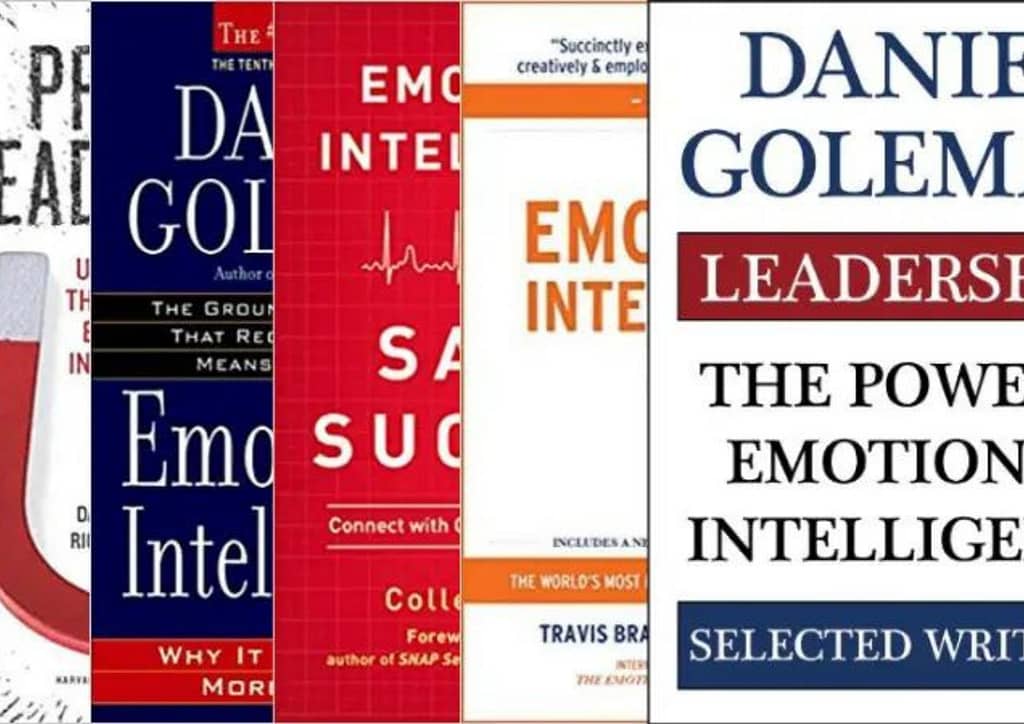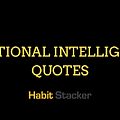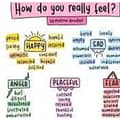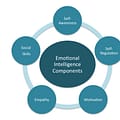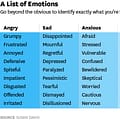‘’In a study of skills that distinguish star performers in every field from entry-level jobs to executive positions, the single most important factor was not IQ, advanced degrees, or technical experience, it was EQ. Of the competencies required for excellence in performance in the job studies, 67% were emotional competencies.”
Daniel Goleman
‘’75% of careers are derailed for reasons related to emotional competencies, including the inability to handle interpersonal problems; unsatisfactory team leadership during times of difficulty or conflict; or inability to adapt to change or elicit trust.”
The Center for Creative Leadership
The two quotes on Emotional Intelligence reveal the importance of Emotional Intelligence in today’s job market.
Emotional Intelligence is a critical leadership skill that all Managers and Leaders in any field must master because it is the key to improving your effectiveness.
It has been found that Leaders with strong emotional intelligence skills rise above any situation. They don’t let other people push their buttons, and can connect with others more effectively.
Mastering your emotional intelligence helps you to deal with impulses, and stress and respond instead of reacting.
On the other hand, a lack of emotional intelligence limits your ability to manage yourself, manage others, or manage situations.
To help you succeed in your career, personal life, and relationships, I have compiled a list of books on emotional intelligence in this post.
Please Note: I independently select all products and services. If you click through the links I provide, I may earn a commission from Amazon.
1. Emotional Intelligence: Why It Can Matter More Than IQ

“A thoughtfully written, persuasive account explaining emotional intelligence and why it can be crucial.”—USA Today
In this book, Daniel Goleman has compiled reports from psychology and neuroscience and offers a new insight into our two minds, the rational and the emotional, which are responsible for shaping our destiny.
He proves that High IQ cannot guarantee success and happiness. The most important factors are self-awareness, self-discipline, and empathy which help you become smart.
He states that emotional intelligence can be developed and strengthened in adulthood and provides immense benefits to your health, relationships, and work.
In a time when technology is making great advancements, jobs are becoming automated and we are spending more time over the internet, the book prepares you to reach your fullest potential and stand out from the crowd by nurturing your emotional intelligence.
A must-read book if you wish to be smart and stand out from the crowd.
GET IT HERE
KINDLE
HARDCOVER
PAPERBACK
2. Primal Leadership: Unleashing the Power of Emotional Intelligence

From bestselling authors Daniel Goleman, Richard Boyatzis, and Annie McKee, this groundbreaking book remains a must-read for anyone who leads or aspires to lead.
This is the book that established “emotional intelligence” in the business lexicon—and made it a necessary skill for leaders.
The book describes the power and necessity of leadership -self-awareness, empathy, motivation, and collaboration in an economically volatile and technologically complex world.
.
It has been embraced by Leaders and Managers across the globe. The ideas of this book are used in professional training programs, by professional coaches, and in universities and medical schools.
GET IT HERE
AUDIO CD
PAPERBACK
HARDCOVER
3. Working with Emotional Intelligence

A book that Managers and CEOS must read to succeed in their careers.
Daniel Goleman establishes in this book that Emotional Intelligence is the single most important factor for success in job performance and advancement. He proves that EI matters twice more as your IQ.
In leadership, emotional intelligence is 90 percent of what sets stars apart from the mediocre.
Organizations that learn to operate in emotionally intelligent ways are the companies that will remain vital and dynamic in the competitive marketplace of today—and the future.
The book is full of interesting case studies, of triumphs and disasters and dramatic turnarounds from studies in more than 500 organizations.
It is a practical guide for all leaders to acquire the 5 key sets of skills essential for emotional intelligence and foster them.
Working with Emotional Intelligence could prove to be the most important reference for bottom-line business people in the first decades of the 21st century.
GET IT HERE
PAPERBACK
HARDCOVER
4. Emotional Intelligence 2.0 Book Summary

In today’s fast-paced world of competitive workplaces and turbulent economic conditions, each of us is searching for effective tools that can help us to manage, adapt, and strike out ahead of the pack.
Emotional Intelligence 2.0 delivers a step-by-step program for increasing your EQ via four, core EQ skills that enable you to achieve your fullest potential:
1) Self-Awareness
2) Self-Management
3) Social Awareness
4) Relationship Management
GET IT HERE
HARDCOVER
5. Emotional Intelligence For Dummies Review

In this helpful guide, Dr. Stein shows you how to take control of your emotions, rather than letting them have control over you.
Emotional awareness and regulation is an important skill for career success and building healthy relationships with people in the workplace.
Full of lively examples and practical advice and exercises, it is an ideal book for anyone wanting to get smarter about their feelings and reach the next level in their professional and personal life.
.
-
Manage your emotions – identify your feelings, determine what beliefs cause negative emotions, and stop self-destructive behaviors
-
Discover the power of empathy – read other people’s emotions through facial cues and body language and show them you understand their feelings
-
Thrive at work – find a job that’s right for you, overcome hassles and fears, and develop your leadership skills
-
Build and sustain meaningful relationships – discover how to take your partner’s emotional temperature and manage emotions to grow closer
-
Raise an emotionally intelligent child – keep your cool with your child, coax shy children out of their shells, and get your child to be less aggressive and defiant
GET IT HERE
KINDLE
PAPERBACK
AUDIO CD
6.Leadership: The Power of Emotional Intelligence

“I’ve pulled together more than two decades’ worth of my writings that best illustrate EI’s positive impact on personal and organizational excellence,” Goleman says.
“Consider the book your toolbox. Each chapter is a unique and useful device that helps leaders, coaches, human resources officers, managers, and educators to effectively guide and motivate others.”
Daniel Goleman’s Leadership: The Power of Emotional Intelligence is the first comprehensive collection of his key findings on leadership.
This often-cited, proven-effective material will help develop stellar management, performance, and innovation.
.
GET IT HERE
KINDLE
PAPERBACK
7. Becoming a Resonant Leader: Develop Your Emotional Intelligence, Renew Your Relationships, Sustain Your Effectiveness

Practical and inspiring, Becoming a Resonant Leader is your hands-on guide to developing emotional intelligence, renewing and sustaining yourself and your relationships, and taking your leadership to a whole new level.
This book is ideal for anyone seeking personal and professional development
‘’Exceptional leaders capture passion. They lead for real: from the heart, smart and focused on the future, and with a commitment to being their very best.’’
In this book, McKee, Boyatzis, and Frances Johnston share vivid, real-life stories illuminating how people can develop emotional intelligence, build resonance, and renew themselves from 20 years of research and practical wisdom with executives and leaders around the world.
The tools in the book help you articulate your strengths and values, craft a plan for intentional change, and create resonance with others.
GET IT HERE
KINDLE
PAPERBACK
AUDIO CD
8.The Emotionally Intelligent Manager: How to Develop and Use the Four Key Emotional Skills of Leadership

David R. Caruso and Peter Salovey provide a new perspective on emotions as against the one held earlier that emotions should be felt and expressed in carefully controlled ways, and then only in certain environments and at certain times.
This is especially true when at work, particularly when managing others. It is considered unprofessional to express emotion while on the job, and many of us believe that our biggest mistakes and regrets are due to our reactions at those times when our emotions get the better of us.
The emotion centers of the brain, they say, do not hold a secondary place in our thinking and reasoning, but are an integral part of thought, reasoning, and intelligence.
In The Emotionally Intelligent Manager, they show that emotion is not just important, but necessary for us to make good decisions, take action to solve problems, cope with change, and succeed.
They provide a practical four-part hierarchy of emotional skills: identifying emotions, using emotions to facilitate thinking, understanding emotions, and managing emotions—and show how we can measure, learn, and develop each skill and employ them in an integrated way to solve our most difficult work-related problems.
GET IT HERE
WILEY.COM
9 . At the Heart of Leadership: How To Get Results with Emotional Intelligence

This book shows you how to lead more effectively by engaging your own and your people’s emotions.
It delivers a compelling case for leaders to attend to their own and their people’s emotions as a critical asset for optimal performance.
It is different from other books on emotional intelligence in that it provides an actionable roadmap. You’ll learn the Six Seconds EQ Model, a practical three-step process to becoming more effective with emotions.
Freedman is one of the handfuls of leaders in the world who has proven experience raising organizational performance with emotional intelligence.
He has used stories and data from his work around the world with organizations such as the US Marine Corps, Schlumberger, and FedEx.
GET IT HERE
KINDLE
HARDCOVER
PAPERBACK
10.Thinking, Fast and Slow

In his mega-bestseller, Thinking, Fast and Slow, Daniel Kahneman, world-famous psychologist and winner of the Nobel Prize in Economics, takes us on a groundbreaking tour of the mind and explains the two systems that drive the way we think.
System 1 is fast, intuitive, and emotional; System 2 is slower, more deliberative, and more logical.
The impact of overconfidence on corporate strategies, the difficulties of predicting what will make us happy in the future, and the profound effect of cognitive biases on everything from playing the stock market to planning our next vacation―each of these can be understood only by knowing how the two systems shape our judgments and decisions.
Kahneman reveals where we can and cannot trust our intuitions and how we can tap into the benefits of slow thinking.
He offers practical and enlightening insights into how choices are made in both our business and our personal lives―and how we can use different techniques to guard against the mental glitches that often get us into trouble.
GET IT HERE
PAPERBACK
11. A Practical Guide to Emotional Intelligence: Get Smart about Emotion
If you want to improve your personal and professional relationships by learning a range of mental skills that can help you to successfully manage both yourself and the demands of working with others, then this practical Guide will help you to become aware of your feelings and those of others, understand them and manage their impact.
It is filled with exercises, case studies, and useful tips that teach you to stay in control, interpret body language and cope with negativity.
Get this book to get smart about emotions and improve both your physical and psychological well-being.
GET IT HERE
KINDLE
HARDCOVER
PAPERBACK
12. Emotional Intelligence Pocketbook: Little Exercises for an Intuitive Life

The way you approach your thoughts and feelings determines your happiness and success in every area of your life.
Being smart, clever, or highly skilled does not guarantee success or fulfillment.
Your ability to manage your feelings, other people, and your interactions with them is what makes all the difference.
Gill Hasson changes the way you think about your emotions in this highly practical book is full of advice, tips, and techniques to help you:
-
Understand and manage your emotions
-
Become more assertive and confident
-
Develop your social skills and your interactions with others
-
Handle difficult situations, events, and other people
The Emotional Intelligence Pocketbook is your practical “how-to” guide that will help you understand yourself and those around you with practical tips and tricks that will help you be more assertive, forge stronger relationships and manage anxiety.
GET IT HERE
WILEY.COM
13. Quick Emotional Intelligence Activities for Busy Managers: 50 Team Exercises That Get Results in Just 15 Minutes

This simple, easy-to-use book gives managers, supervisors, and team leaders activities to help their teams overcome emotional barriers to enhance their effectiveness.
This practical, effective collection of proven exercises will bring out the best in any team.
Those interested in finding out more about the connection between Emotional Intelligence and Leadership Effectiveness can choose among different exercises tailored to different degrees of experience.
It also contains useful exercises to address a lack of trust within teams for better collaboration.
In Quick Emotional Intelligence Activities for Busy Managers, you will find powerful, proven exercises they can use to help employees:
-
Identify individual and team mood
-
Deal with anger and emotional triggers
-
Avert, rather than avoid, conflict
-
Encourage communication
-
Overcome fear and other obstacles
-
Understand and manage competition
-
Honor differences
-
Assess team strengths and weaknesses
-
Pick up on cues from teammates
-
Control the emotional climate of the team
Each activity is followed by a discussion of its purpose, how to use it, and a list of post-activity questions to help solidify each lesson.
GET IT HERE
AMAZON
14.105 Tips for Creating an Emotionally Intelligent Organization: More Success by Focusing on Work Attitude and Motivation

Each of the authors of this book works as a trainer, consultant, or coach to create more emotionally intelligent workplaces and .have come together to give you practical tips on how it can be done.
You will learn how simple ideas can make a huge difference in all aspects of what tends to be called “human resources management”: recruiting, training, coaching, managing, building teams, handling conflicts, retention, and even outplacement.
It is a helpful resource to build an emotionally intelligent organization where there is empathy in the sense that people understand what is important to others, and know how their colleagues are motivated, like to organize their work and get a chance to do the work they like doing, maximize their strengths.
GET IT HERE
KINDLE
PAPERBACK
15.EQ APPLIED
In this age of social media attacks, constant distraction, and rampant corruption, a high emotional intelligence quotient, or EQ, is more important than ever.
Justin Bariso brings the concept of emotional intelligence up to date and into the real world, combining scientific research with high-profile examples and personal stories.
For example, in EQ Applied you’ll:
-
Examine one of the most famous business stories of all time–Steve Jobs’s exit and return to Apple–from a completely different angle…and reveal a major lesson in the process.
-
Learn how to control your emotional reactions–and see how a modern-day “miracle” brought this ability to life.
-
Learn how to break bad habits and escape “emotional hijacks.”
-
See the power of emotional influence in action–illustrated through powerful stories from the FBI’s former lead kidnap investigator, a famous singer, and many more.
-
Discover how emotional intelligence can be used for evil–and how you can protect yourself.
Learn how to make emotions work for you, instead of against you. That’s EQ Applied.
GET IT HERE
KINDLE
HARDCOVER
PAPERBACK
16. Emotional Agility: Get Unstuck, Embrace Change, and Thrive in Work and Life by Susan David

The path to personal and professional fulfillment is rarely straight.
Ask anyone who has achieved his or her biggest goals or whose relationships thrive and you’ll hear stories of many unexpected detours along the way.
Emotional Agility separates those who master these challenges from those who get derailed.
EA is a revolutionary, science-based approach that allows us to navigate life’s twists and turns with self-acceptance, clear-sightedness, and an open mind.
Renowned psychologist Susan David developed this concept after studying emotions, happiness, and achievement for more than twenty years. She found that no matter how intelligent or creative people are, or what type of personality they have, it is how they navigate their inner world—their thoughts, feelings, and self-talk—that ultimately determines how successful they will become.
The way we respond to these internal experiences drives our actions, careers, relationships, happiness, and health—everything that matters in our lives.
As humans, we are all prone to common hooks—things like self-doubt, shame, sadness, fear, or anger—that can too easily steer us in the wrong direction.
Emotionally agile people are not immune to stresses and setbacks. The key difference is that they know how to adapt, aligning their actions with their values and making small but powerful changes that lead to a lifetime of growth.
Emotional agility is not about ignoring difficult emotions and thoughts; it’s about holding them loosely, facing them courageously and compassionately, and then moving past them to bring the best of yourself forward.
Drawing on her deep research, decades of international consulting, and her own experience overcoming adversity after losing her father at a young age, David shows how anyone can thrive in an uncertain world by becoming more emotionally agile.
To guide us, she shares four key concepts that allow us to acknowledge uncomfortable experiences while simultaneously detaching from them, thereby allowing us to embrace our core values and adjust our actions so they can move us where we truly want to go.
Written with authority, wit, and empathy, Emotional Agility serves as a road map for real behavioral change—a new way of acting that will help you reach your full potential, whoever you are and whatever you face.
GET IT HERE
HARDCOVER
PAPERBACK
17. THE LANGUAGE OF EMOTIONAL INTELLIGENCE
. Dr. Jeanne Segal has used the latest research and true-to-life examples to design a step-by-step program that shows you how to incorporate the five basic tools of emotional intelligence to enhance your relationships in the workplace, at home, and in all areas of your life.
You’ll learn how to:
-
“Read” other people
-
Make powerful connections
-
Defuse arguments and conflicts
-
Repair wounded feelings
-
Understand nonverbal cues
-
Build stronger, more satisfying relationships
-
It is packed with simple exercises, revealing self-quizzes, and proven calming techniques.
This user-friendly guide can help you reach into the hearts and minds of others–sometimes without saying a word!
GET IT HERE
PAPERBACK
KINDLE
18. Go Suck a Lemon: Strategies for Improving Your Emotional Intelligence

.”Go Suck A Lemon” hopes to provide readers with methods for improving emotional intelligence by offering cognitive skill-building techniques, thereby helping to create a less self-defeating and more enriching experience when experiencing emotion.
GET IT HERE
PAPERBACK
KINDLE
HARDCOVER
19.THE EMOTIONAL INTELLIGENCE QUICK BOOK

.
Authors Bradberry and Greaves use their years of experience as emotional intelligence researchers, consultants, and speakers to revitalize our current understanding of emotional intelligence.
They have combined their latest research on emotional intelligence with a quick, easy-to-use format and cut-to-the-chase information to demonstrate how this other kind of “smart” helps us to decrease our stress, increase our productivity, understand our emotions as they happen, and interact positively with those around us.
The Emotional Intelligence Quickbook shows us how understanding and utilizing emotional intelligence can be the key to exceeding our goals and achieving our fullest potential.
The Emotional Intelligence Quick Book makes EQ practical and easy to apply in every aspect of our daily lives.
The Quickbook will help you to:
-
Engage the four unique areas of EQ: self-awareness, self-management, social awareness, and relationship management
-
Increase your EQ through the use of these skill-building techniques
-
Apply your EQ at work to develop leadership skills and improve teamwork, making you a better manager and a more desirable employee
-
Practice your EQ outside the office environment to benefit your relationships with loved ones, making you a better partner and parent
-
Access the link between your EQ and your physical well-being to improve your overall health
-
Measure your current EQ through access to the authors’ bestselling online Emotional Intelligence Appraisal
GET IT HERE
HARDCOVER
PAPERBACK
MASS MARKET PAPERBACK
20. HBR’s 10 Must Reads on Emotional Intelligence (with featured article “What Makes a Leader?” by Daniel Goleman)(HBR 10 Must Reads)

Read these 10 articles by experts in the field. It contains the most important articles from the HBR archive to boost your emotional skills and your professional success.
This collection of articles includes: “What Makes a Leader” by Daniel Goleman, “Primal Leadership: The Hidden Driver of Great Performance” by Daniel Goleman, Richard Boyatzis, and Annie McKee, “Why It’s So Hard to Be Fair” by Joel Brockner, “Why Good Leaders Make Bad Decisions” by Andrew Campbell, Jo Whitehead, and Sydney Finkelstein, “Building the Emotional Intelligence of Groups” by Vanessa Urch Druskat and Steve B. Wolff, “The Price of Incivility: Lack of Respect Hurts Morale―and the Bottom Line” by Christine Porath and Christine Pearson, “How Resilience Works” by Diane Coutu, “Emotional Agility: How Effective Leaders Manage Their Negative Thoughts and Feelings” by Susan David and Christina Congleton, “Fear of Feedback” by Jay M. Jackman and Myra H. Strober, and “The Young and the Clueless” by Kerry A. Bunker, Kathy E. Kram, and Sharon Ting.
This book will inspire you to:
-
Monitor and channel your moods and emotions
-
Make smart, empathetic people decisions
-
Manage conflict and regulate emotions within your team
-
React to tough situations with resilience
-
Better understand your strengths, weaknesses, needs, values, and goals
-
Develop emotional agility
GET IT HERE
PAPERBACK
HARDCOVER
KINDLE
21. The EQ Difference: A Powerful Plan for Putting Emotional Intelligence to Work
Emotional Intelligence (EI) is a strong indicator of individual, team, and organizational success.
But stocking up on emotionally intelligent employees isn’t enough: you need a concrete plan for putting this valuable resource to work.
The book offers a wide range of self-assessment tools and team-focused exercises that will help increase and leverage emotional intelligence both in individuals and in groups.
It’s filled with practical tips and suggestions for developing your own “emotional quotient,” as well as that of your peers, employees, and even senior executives.
It features real workplace examples, Letters to Leaders, and excerpts from actual performance reviews that show the positive impact of EI in a variety of environments,
The EQ Difference will help your organization achieve greater productivity, higher morale, and better employee retention — all keys to stronger bottom-line results.
GET IT HERE
KINDLE
PAPERBACK
CONCLUSION
I hope you have found the list of books very helpful. If you commit to improving your emotional Intelligence now, which is one book you will invest in reading today?
Share your thoughts below .

